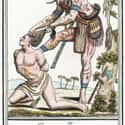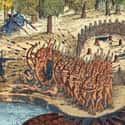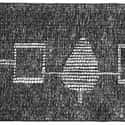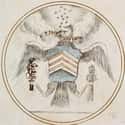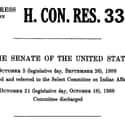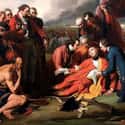-
(#1) The Founding Fathers Stole Political Systems From Native Americans
The Founding Fathers “borrowed” a number of ideas from Native Americans, especially from the Iroquois Confederacy. Benjamin Franklin in particular pointed to the Iroquois as an example of a sound federal governing system.
Franklin highly respected the Iroquois Confederacy, a grouping of six different tribes united under a banner of diplomacy, and sought to model the colonies' own unity after this system. When Franklin spoke at the Albany Congress, a meeting between Colonists and the Iroquois, he introduced the Albany Plan of Union, where a president presided over a group of colonial delegates, similar to the Iroquois Confederacy.
But even while the Founding Fathers took ideas from Native Americans, they still called them savages.
-
(#2) Some Saw Native Americans As Vicious, Bloodthirsty, And Barely Human
For centuries, European colonists fought with Native Americans as white settlers continued to seize Native American land. As wars decimated both sides, Europeans often argued Native Americans were only “semi-human" at best, “beasts” at their very worst.
In 1739, Reverend John Callender ranked the Native Americans against other peoples, concluding, “The Indians in this part of America appear to have been some of the least improved of the human species, without any learning or knowledge in any of the politer arts of life.”
These negative stereotypes about Native Americans, born from fear and bigotry, colored colonists' views of the First Americans. Such negative stereotyping only served American colonial interests; by turning tribes into enemies of the people, the people would never feel any issue driving them out.
-
(#3) The Bloody Indian Wars Lasted For Four Centuries
In 1750, Reverend Johann Martin Bolzius wrote of Native Americans, “Among themselves they are almost always engaged in war, and kill one another." Their "primitive" tools and "uncivilized" dress only served to turn settlers against Natives.
Many colonists believed this narrative, only because they remained in constant war with Native Americans. By claiming that their enemies were “savages” with little to teach Europeans, white colonists managed to assert their agenda as the righteous, civilized path. These battles stretched from 1492 all the way to the 1890 Massacre at Wounded Knee (and beyond, by some accounts).
-
(#4) But Some, Like Benjamin Franklin, Complimented Native Americans
In the 1780s, Benjamin Franklin wrote “Remarks Concerning the Savages of North America.” In spite of calling them “savages,” he complimented the Native Americans, making note of “Indian rules of politeness” and how such manners played into effective diplomacy. These descriptions featured not a group of bloodthirsty savages, but respectable groups whose customs and traditions could serve the burgeoning American government.
Franklin made this exact point when he wryly noted, “Savages we call them, because their manners differ from ours, which we think the perfection of civility; they think the same of theirs.”
-
(#5) Benjamin Franklin Used Comparisons With Native Americans To Encourage Colonists
Franklin’s strategy drew on a long tradition of using so-called “savages” to encourage behavior in his own society.
Roman Senator and historian Tacitus famously used the “barbarian” Germans to criticize the loose morals of Roman women: “No one in Germany laughs at vice, nor do they call it the fashion to corrupt and to be corrupted.” By complimenting "barbarians," Tacitus hoped to shame wanton Romans into reforming their ways.
Similarly, when Franklin complimented the “savage” Iroquois, he wanted to encourage the Colonists to both imitate and surpass the Native Americans.
-
(#6) Franklin Called The British House of Commons “Indecent” Compared To The “Savages”
Benjamin Franklin complemented the “order and decency” of Iroquois public councils. Speakers would be met with silence, allowed to deliver their words uninterrupted, and even received several minutes after speaking to add anything they had forgotten.
Franklin marveled, “How different this is from the conduct of a polite British House of Commons, where scarce a day passes without some confusion that makes the Speaker hoarse in calling to order.” He went on to complain about “polite companies” in Europe who interrupt each other, forcing everyone to speak loudly and quickly.
The U.S. Senate, as designed by the Constitution, was meant to similarly represent "order and decency."
-
(#7) The Very Idea Of A Federal Government Came From The Iroquois
The Iroquois Nation, a federation of the Mohawk, Oneida, Onondaga, Cayuga, Seneca, and Tuscarora tribes, stood as direct opposites to Europe's isolated monarchies. Rather than protecting the sole interests of their own people, the tribes of the Iroquois represented a loosely knit bond between semi-independent allies.
In 1792, the editor of the National Gazette called the Iroquois “republicans rather than aristocrats or monarchy men." This made the Iroquois more similar to the fledgling United States than nearly any other government system in history—even though the Founding Fathers gave most of the credit to ancient Rome and Greece.
Small wonder that the American Indian Institute termed the flag of the Iroquois, representing the bonds between the original five members, to be the "first draft of the Constitution."
-
(#8) The Iroquois Were A Model For Franklin’s Vision For the Colonies
In 1754, years before the American Revolution, Benjamin Franklin already began thinking about how the colonies might break away from Great Britain. And he explicitly pointed to the Iroquois as a model.
At the Albany Congress, Franklin said, “It would be a strange thing if six nations of ignorant savages should be capable of forming such a union, and yet it has subsisted for ages and appears indissolvable, and yet a like union should be impractical for 10 or a dozen English colonies.”
Even Franklin’s famous image of the colonies as a snake, with the caption “Join, or Die,” drew upon the imagery of the Iroquois flag. Franklin’s political image argued that unless the colonies forged a bond between themselves, as the Iroquois had, they would all perish.
-
(#9) Iroquois Leaders Even Attended The Continental Congress And Gave the Founding Fathers Advice
In the summer of 1775, after war broke out at Lexington and Concord, the Founding Fathers met in the Continental Congress to form a new government. A group of Iroquois sachems and warriors reminded the Founding Fathers of the words of Canassatego, a powerful Iroquois diplomat who spoke at the signing of the Treaty of Lancaster in 1744.
Canassatengo described the founding of the Iroquois League as: “Our Wise Forefathers established Union and Amity between the Five Nations. We are a powerful Confederacy, and if you observe the same methods . . . you will acquire fresh strength and power.”
The Americans responded that their forefathers had followed the advice. “The Six Nations are a wise people, let us hearken to their Council and teach our children to follow it."
-
(#10) Even The Great Seal Of The United States Echoes Iroquois Practices
In 1776, the Continental Congress passed a resolution stating the new country needed a seal. It appointed Benjamin Franklin, John Adams, and Thomas Jefferson, the heroes of the Declaration of Independence, to design one.
The final design, adopted in 1782, included a feature borrowed from the Iroquois. The bald eagle on the seal held 13 arrows in its left talon, representing the thirteen colonies. The Iroquois Constitution described the symbols of the Iroquois Nations in almost identical terms: “five arrows shall be bound together very strong and each arrow shall represent one nation. As the five arrows are strongly bound this shall symbolize the complete union of the nations.”
-
(#11) In 1988, A Senate Resolution Finally Acknowledged The Constitution’s Debt To Native Americans
On the two hundredth anniversary of the signing of the Constitution, the Senate finally acknowledged the Founding Fathers adapting ideas from Native Americans.
The Senate Resolution stated “the original framers of the Constitution . . . are known to have greatly admired the concepts of the Six Nations of the Iroquois Confederacy.” It went on to conclusively proclaim “the confederation of the original Thirteen Colonies into one republic was influenced by the political system developed by the Iroquois Confederacy as were many of the democratic principles which were incorporated into the Constitution itself."
Better 200 years late than never, right?
-
(#12) The Founding Fathers Proclaimed That All Men Are Created Equal, But The Native Americans Had More Equality
The words of the Declaration of Independence proclaim that “all men are created equal,” even though America's development stems from inequality written into the Constitution. When Jefferson penned those words, he owned slaves––considered three-fifths of a person by the Constitution––and the Constitution excluded non-whites, women, and even men who didn’t own property from fundamental rights.
Perhaps the Founding Fathers should have borrowed even more from the Native Americans. James Adair, an Irish observer of the Chickasaw, wrote in 1775 that, “They are all equal ⎯ the only precedence any gain is by superior virtue, oratory, or prowess; and they esteem themselves bound to live and die in defense of their country."
Iroquois women too played a powerful role in their society, selecting the sachems and holding veto power over the men’s decisions. If only the Founding Fathers paid even closer attention to the Native Americans.
New Random Displays Display All By Ranking
About This Tool
The Mayflower, which landed on the east coast of the United States in 1620, was of great significance in modern American history, but for the Indians who have lived on this continent for generations, it was the beginning of their tragic fate. The independence of the United States was full of incidents of the expulsion and massacre of Indians. Today, these native Americans are still facing inequality and abuse.
For nearly a hundred years after the founding of the United States, it implemented genocide policies and the westward movement to expel and kill Indians, and plunder land and resources. By the end of the 19th century, there were fewer than 250,000 Native Americans left. Few people know that the "all American" ideas were taken from the native Americans' miserable life, the random tool introduced more things about the dark history.
Our data comes from Ranker, If you want to participate in the ranking of items displayed on this page, please click here.












